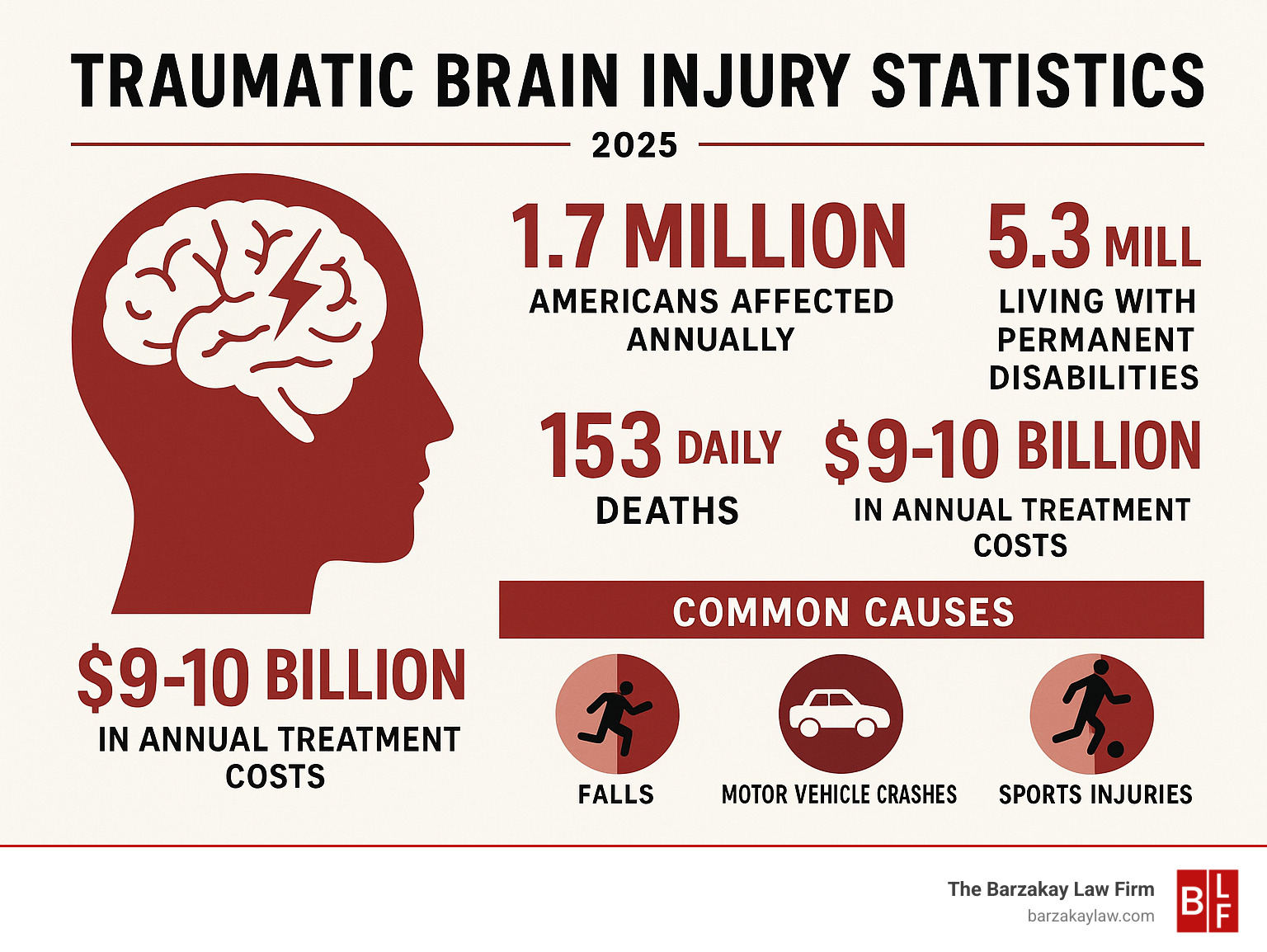Why Brain Injury Lawyers Are Essential When Tragedy Strikes
When a traumatic brain injury strikes, brain injury lawyers are essential for navigating the path to justice and recovery. They understand the complex medical, financial, and emotional challenges, from proving “invisible” symptoms to calculating lifetime care costs that can reach millions.
Quick Answer: What Brain Injury Lawyers Do
- Investigate the cause of your injury and gather evidence
- Work with medical professionals to document your condition
- Calculate current and future medical expenses
- Negotiate with insurance companies on your behalf
- File lawsuits and represent you in court
- Secure compensation for medical bills, lost wages, and pain and suffering
- Handle cases on a contingency fee basis (no upfront costs)
The statistics are sobering. Approximately 1.7 million Americans suffer a traumatic brain injury each year, with 153 victims dying from TBIs daily. Nearly 5.3 million survivors live with permanent disabilities. The impact extends to entire families, with a crushing financial burden. Long-term care can cost from $600,000 to $1.9 million, and annual U.S. treatment costs are between $9-10 billion.
“A brain injury can change a life in a second,” as one New Mexico brain injury law firm puts it. Whether caused by car accidents, falls, or other incidents, these injuries require prompt legal attention to protect your rights. The legal process is complex, requiring lawyers who grasp both the medical details of neurological damage and the long-term financial consequences. TBI cases often involve “invisible” injuries that are hard to prove but deeply affect a person’s ability to work, think, and live independently.

Quick brain injury lawyers terms:
Understanding the Scope of a Traumatic Brain Injury
For brain injury lawyers, understanding the medical realities of a traumatic brain injury is the foundation for a strong legal case. A traumatic brain injury (TBI) occurs when an external force disrupts normal brain function. The injury can range from a seemingly minor bump to a life-altering event.
Other related injuries include:
- Acquired Brain Injuries (ABI), which result from internal issues like strokes, tumors, or lack of oxygen.
- Concussions, the most common type of TBI. They are a serious brain injury, even without loss of consciousness, and can have lasting effects.
- Coup-contrecoup injuries, where the brain hits one side of the skull and then bounces back, hitting the opposite side.
Brain injuries are also classified as primary (damage at the moment of impact) or secondary (a chain reaction of cellular and chemical changes in the hours and days following the injury). This is why immediate medical attention is critical.

For more medical details, the CDC’s guide to brain injuries is a great resource. We also explore these impacts in our discussion on The Long-Term Effects of TBI.
Common Symptoms and Classifications
Brain injury symptoms are unique and can be delayed, making diagnosis difficult. They are often called “silent injuries” because they may not appear immediately. Symptoms fall into several categories:
- Physical symptoms: Persistent headaches, dizziness, fatigue, blurred vision, nausea, coordination problems, seizures, or paralysis.
- Cognitive symptoms: Memory loss, confusion, and difficulty concentrating, making simple tasks feel overwhelming.
- Behavioral changes: Irritability, depression, anxiety, personality changes, and poor impulse control, which can be especially hard on families.
Brain injuries are classified by severity:
- Mild TBI: Also known as a concussion, this is a serious injury that can cause temporary confusion and headaches. Some individuals develop post-concussion syndrome.
- Moderate TBI: Involves a longer period of unconsciousness or confusion with more persistent symptoms.
- Severe TBI: Involves an extended period of unconsciousness or coma, often leading to significant and permanent impairments.
Even a “mild” brain injury can profoundly affect a person’s ability to work and live. We discuss these impacts in our resources on catastrophic brain injuries.
Incidents That Lead to Brain Injury Claims
Brain injury lawyers often handle cases resulting from another’s negligence. Common incidents leading to TBI claims include:
- Car accidents: The force of a crash can cause the brain to strike the skull, leading to TBI.
- Slip and fall accidents: The most common cause of TBI, especially for children and older adults, often due to unsafe property conditions.
- Medical malpractice: Can include anesthesia errors, failure to diagnose strokes or infections, or birth injuries.
- Construction site accidents: Falling objects, scaffold collapses, or heavy machinery accidents can cause devastating head injuries.
- Defective products: A faulty tire causing a crash or defective safety equipment can lead to head trauma.
- Sports injuries: Legal cases can arise from negligent coaching, inadequate safety protocols, or defective equipment.
- Assaults: Acts of violence are a common cause of severe head trauma.
If someone else’s negligence caused the injury, you may have the right to pursue compensation. For information specific to South Florida, visit our page on Hollywood traumatic brain injury cases.
The Critical Role of Brain Injury Lawyers
After a brain injury, you need a legal advocate who understands these unique and complex cases. They can steer the medical challenges, fight for your future, and protect your rights. Unlike a broken bone, a brain injury affects every aspect of life—thoughts, personality, and relationships. Brain injury lawyers champion your cause in a fight that determines your future.
Navigating complexity is their daily work. They understand that brain injuries are often “invisible,” with damage that doesn’t appear on standard scans but dramatically affects how you think and feel. They work with neurologists and other medical professionals to document the full extent of your injury.
Calculating future damages is a critical part of their work. A brain injury often requires a lifetime of care, with costs reaching millions of dollars. Lawyers project these costs decades into the future. They also fight insurance companies that try to minimize claims by arguing symptoms are pre-existing or exaggerated. We call this the “squid defense”—creating confusion to avoid paying what is owed.
Protecting your rights is our mission. We operate on contingency fees, meaning you pay nothing upfront. We only get paid if we win your case, ensuring that insurance companies can’t use their financial power to outlast you.

How a Lawyer Helps Steer the Legal Process
An experienced brain injury lawyer handles the legal process so you can focus on healing. Key steps include:
- Investigation: We immediately gather evidence like police reports, photos, witness statements, and surveillance footage to build a strong case for negligence.
- Evidence Gathering: We analyze medical records, sometimes from years before the injury, to establish a baseline and show how your life has changed.
- Working with Professionals: We assemble a team of neurologists, neuropsychologists, and economists. Life care planners are particularly valuable, creating detailed roadmaps of your future medical and financial needs.
- Negotiating Settlements: We prepare every case for trial, which encourages insurance companies to make more reasonable settlement offers.
- Court Representation: If a fair settlement isn’t reached, we are prepared to present your case to a judge and jury, using medical evidence and testimony to show the injury’s true impact.
- Managing Legal Deadlines: We track all deadlines, as missing a state’s statute of limitations can mean losing your right to compensation forever.
Why a Dedicated Brain Injury Lawyer Matters
Brain injuries are different from other injuries, demanding a lawyer who understands their unique challenges. A TBI is a life-altering event affecting identity, relationships, and future possibilities.
Key reasons a dedicated lawyer is crucial:
- Understanding “invisible” injuries: They know how to prove the devastating impact of symptoms like memory loss or personality changes that aren’t physically obvious.
- Medical complexity: They can interpret neurological reports and translate complex medical concepts for insurance adjusters and juries.
- Long-term financial needs: They have experience accurately calculating the staggering lifetime costs of care, which can run into the millions.
- Access to a network of professionals: We can connect you with neurologists, therapists, and support groups who work with TBI patients.
- Proving causation: They know how to counter insurance company tactics that blame your symptoms on pre-existing conditions, stress, or aging.
Brain injury cases require a different approach and deeper resources. For more insights, read Why you need a TBI Attorney.
Securing Fair Compensation for a Lifetime of Needs
Compensation in a TBI case goes far beyond immediate medical bills. It’s about securing a future for someone whose life has been permanently altered. Brain injury lawyers know a fair settlement must cover not just current bills, but all future needs.
A brain injury can permanently alter your life’s path, affecting your career and personal interactions. These are financial realities that compensation must address. Damages are categorized as:
- Economic damages: Tangible, calculable losses like medical bills and lost wages.
- Non-economic damages: Compensation for harder-to-measure losses like pain and suffering or loss of enjoyment of life.
- Punitive damages: Awarded in rare cases of extreme recklessness to punish the wrongdoer.
Calculating future needs is complex and may require projecting costs over a lifetime. It’s not uncommon for these projections to reach millions of dollars, which is why having experienced brain injury lawyers is so important. We have seen cases result in multi-million dollar verdicts and settlements that provide crucial financial stability for victims and their families.

Recoverable Economic Damages
Economic damages are the tangible financial losses from a brain injury. Proper calculation must account for both immediate and long-term expenses, including:
- Current and future medical bills: This covers everything from the initial emergency room visit to lifelong medications and neurologist appointments.
- Rehabilitation costs: Extensive therapy is often needed. This includes physical therapy for motor skills, occupational therapy for daily activities, and speech therapy for communication.
- Lost wages and diminished earning capacity: We seek compensation for lost income during recovery and for any long-term impact on your ability to earn a living.
- In-home care and medical equipment: This covers costs for nursing care, personal aides, wheelchairs, specialized beds, or communication devices.
- Transportation costs: Expenses for travel to and from medical appointments and therapy sessions.
Compensation for Non-Economic Losses
Non-economic damages compensate for the profound, non-monetary ways a TBI alters your life. These losses are devastating and include:
- Pain and suffering: This covers both the physical pain of the injury and the emotional distress, such as anxiety and depression.
- Loss of enjoyment of life: Compensation for the inability to participate in hobbies, social activities, and relationships that once brought you joy.
- Chronic pain: Many TBI survivors deal with persistent headaches or other pain that severely impacts their quality of life.
- Personality changes: Frontal lobe injuries can cause mood swings, irritability, or poor impulse control, which is heartbreaking for families.
- Loss of consortium: This addresses the negative impact of the injury on your relationship with your spouse or partner.
These damages often represent a significant portion of the compensation package. For more details, please see More on traumatic brain injury cases.
How to Choose the Right Legal Advocate
Selecting the right legal team is one of the most important decisions you will make. Choosing the right brain injury lawyers is a critical decision that impacts your recovery and future. You need an advocate with proven experience in these complex cases.
At The Barzakay Law Firm, we offer free consultations to discuss your case without obligation. When evaluating lawyers, look for:
- A strong trial record: Insurance companies take lawyers who are prepared to go to court more seriously, which can lead to better settlement offers.
- Positive client testimonials: These offer insight into how a firm treats its clients during difficult times.
- Clear communication: You need a team that provides regular updates and explains complex issues in plain English.
- Sufficient firm resources: Brain injury cases require significant upfront investment in evaluations and professionals. A well-resourced firm can cover these costs.
- A contingency fee structure: Most reputable firms work on this basis, meaning you pay nothing unless you win. This ensures everyone has access to quality representation.
We serve clients throughout Florida, including Hollywood, Miami, Boca Raton, Sunrise, Orlando, and Fort Lauderdale. Find a brain injury lawyer near you to explore your options.
Key Questions to Ask Potential Brain Injury Lawyers
When meeting with potential brain injury lawyers, ask targeted questions to gauge their experience and approach:
- How many TBI cases have you handled? Look for specific experience with the medical and legal nuances of TBI cases, not just general personal injury.
- What is your trial experience? A firm’s willingness to go to trial can significantly impact settlement offers.
- Who will be my main point of contact? Understand who you will communicate with and how often you will receive updates.
- How are case costs handled? A quality firm should advance the costs for medical evaluations and other expenses, with repayment coming from the settlement.
- Can you explain your fee structure? Ensure you understand the contingency fee percentage and how expenses are deducted before signing anything.
Red Flags to Avoid When Hiring Brain Injury Lawyers
Be aware of these red flags when choosing a lawyer for your brain injury case:
- Guarantees of a specific outcome: An ethical lawyer cannot promise a specific result, as every case is unique.
- High-pressure tactics: You should not be rushed into signing an agreement without time to consider your options.
- Lack of communication: If a lawyer is hard to reach or unclear during the consultation, it is a bad sign for future communication.
- Unclear fee agreements: A reputable firm will explain all fees and costs clearly and answer all your questions.
- No direct experience with brain injury cases: TBI cases require specialized knowledge. A general personal injury lawyer may lack the understanding needed to maximize your compensation.
By being informed, you can find advocates who will fight for your recovery. For more guidance, please read More info on choosing a brain injury lawyer.
Frequently Asked Questions about Brain Injury Lawsuits
We understand that legal questions can add to your stress after a brain injury. Here are answers to some of the most common concerns we hear.
How much does it cost to hire a brain injury lawyer?
Most brain injury lawyers, including our firm, work on a contingency fee basis. This means you pay no upfront fees. We only get paid if we win or settle your case, with our fee being a percentage of the recovery. This aligns our interests with yours and ensures you can afford legal representation.
Are there time limits for filing a brain injury lawsuit?
Yes. Every state has a strict deadline called a “statute of limitations” for filing a lawsuit, which can be as short as two years. Missing this deadline means you lose your right to seek compensation. Because state laws on time limits can vary, it is critical to contact a lawyer as soon as possible.
What if my brain injury symptoms didn’t appear until weeks or months after the accident?
This is very common with “silent” brain injuries. Symptoms like headaches or memory problems can appear weeks or months later. Many states have a “findy rule,” which means the time limit for filing a lawsuit may not start until you finded (or reasonably should have finded) the injury. Even if time has passed since the incident, you may still have a claim. However, proving the link between the accident and delayed symptoms is complex and requires skilled legal help to counter insurance company arguments. Consult a lawyer to understand your options.
Taking the First Step Towards Justice and Recovery
A traumatic brain injury is an overwhelming event, instantly creating a maze of medical, financial, and emotional challenges. You don’t have to face this alone.
The right legal team can lift this burden, handling the stress of insurance fights and financial calculations so you can focus on recovery. Brain injury lawyers who understand your situation know that behind every case is a person whose life has been turned upside down. Your story matters, and your future deserves protection.
Choosing a compassionate legal advocate is the first step toward securing the resources you need to rebuild your life. At The Barzakay Law Firm, we are committed to helping victims steer these difficult times with dignity and hope.
We’re here when you’re ready to take that first step. Our team serves families across Florida, including Hollywood, Miami, Boca Raton, Sunrise, Orlando, and Fort Lauderdale. We can come to you, and we handle everything on a contingency fee basis—you pay nothing unless we win your case.
The path to recovery may be long, but you don’t have to walk it alone. Contact a traumatic brain injury lawyer for a free consultation and let us help you focus on healing while we fight for your future.
